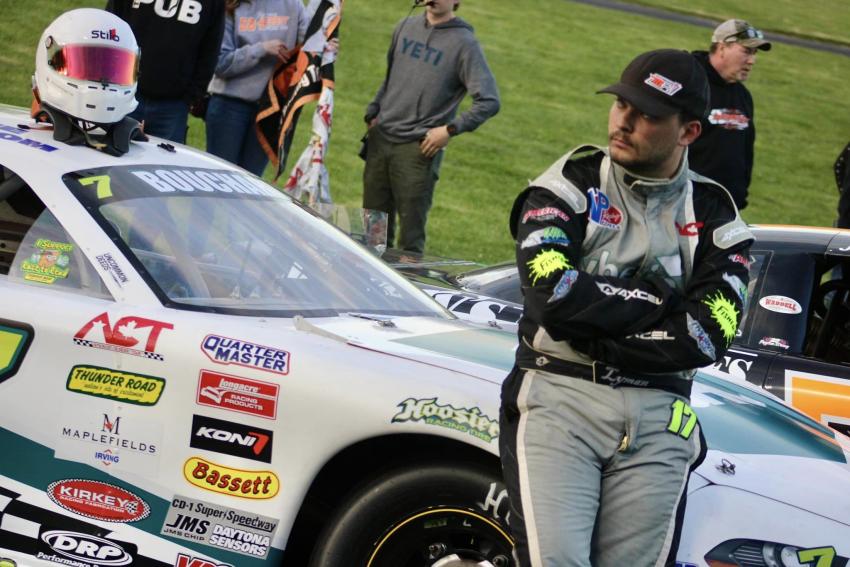Planning for college or training this year? Apply for the Vermont Grant.
Meet Cooper Bouchard, the driver of “the VSAC car” at Thunder Road

“You never lose, but you always learn."
So says Cooper Bouchard of Hinesburg, driver of the VSAC #7VT Late Model at Thunder Road Speedbowl.
“Hindsight is always 20/20, but there’s no sense sitting on the sidelines and feeling sorry for yourself for losing,” he explains. “As long as you take the steps to move past [the loss] in a healthy way, and set your mind to another goal, you’ll keep advancing.”
It’s a philosophy that he applies just as easily to his other pursuits—coaching high school wrestling and building a career in the trades—as he does to auto racing. With this outlook, Cooper is a strong mentor for young people and a great spokesman for VSAC, whose sponsorship supports his racing season this year at Thunder Road.
Bouchard Motorsports: A family affair
Cooper, 26, is in his ninth year of competition at “The Nation’s Site of Excitement.” He says his family is a key part of his team. “I don’t always give my family the recognition they deserve, but I wouldn’t be where I am without them.”
For the Bouchards, racing has always been a family affair. “My parents’ first date included a trip to the junkyard to get parts for my dad’s first racecar,” says Cooper.
Cooper’s dad, David Bouchard, started racing at Thunder Road in 1993 after winning its annual crowdsourced competition, the M&M Beverage Enduro, the year before. He raced in Thunder Road’s Street Stock division until 1997, when work and his growing family (the birth of Cooper) put too many demands on his schedule.
His mom, who now serves as Cooper’s financial manager for Bouchard Motorsports, works at the Thunder Road ticket booth before every race to offset the cost of admission. (As Cooper notes, $35 a week for 16 weeks almost pays for a new set of tires.) “She also tries to keep us all in line at the track when emotions run high. She’s as involved as she can be without turning wrenches."
And one of Cooper’s three older half-sisters, Ciara, comes to the track every week with her three sons, Brantley, 2, Connor,10, and Cameron, almost 13—carrying on the tradition Cooper himself grew up with.
“We always went to the races,” Cooper recalls. “Every Thursday, we would get off the school bus, and Dad would already have the stadium chairs over his shoulder. I remember sitting on Turn 4, the cars sometimes flipping and occasionally catching fire. Racing is something that’s always interested me,” he says, noting that he raced dirt bikes as a kid and a teenager, and he was always playing racing games on a video game console. “Everything seemed to revolve around wheels and a big motor,” he chuckles.
If at first you don't succeed...
Cooper’s first race was at Devil’s Bowl Speedway in Fair Haven, Vermont, and it was an inauspicious start.
“That summer, we had just bought my first car—a front-wheel-drive Chevy Cavalier—and we had three weeks until the Milk Bowl. So we decided to find somewhere to go before that to get my feet wet. In the first feature, I got lapped on lap three in a 15-lap race,” says Cooper, shaking his head. Since he finished last, he started on the pole for the second feature, but by the end of the fourth lap, he spun out and caused a caution. “Then, on the restart, I hit the wall coming out of Turn 4 and bent my rear axle. That ended my night.”
That year’s Milk Bowl race at Thunder Road—his first outing in front of a home crowd—went just about as well. “With six or seven laps to go in the first feature, I ended up getting put into the wall intentionally by one of my now good friends. He thought I was someone else who had wrecked him earlier in the race,” he laughs. “There’s a picture on my Facebook page of my car with four tires up in the air. After that, I swore I would never go back. But of course, I showed up the next day to watch the rest of the races.”
He says the adrenaline keeps him coming back. “There’s just something about those G-forces. It gives me chills just talking about it.”
On the other hand, racing is more than just a thrill ride for Cooper.
When I put my helmet on and strap in, it’s a little bit like a job. You know what you have to do, and you always have certain expectations. You try to compete every single week, not just for yourself but for those who support you—your sponsors and your family. It seems like you’re just turning left all the time, but there’s a lot going on in your head—more gas, more brake, judging the turns—and all those adjustments are constantly working my brain.
Racing, wresting, and reassurance
In that respect, racing is similar to another of Cooper’s passions: wrestling. “It’s a very physically and mentally challenging sport, and there are so many things going on in your head when you’re competing,” he says.
Cooper started wrestling in the second grade, training with the Hinesburg Hurricanes until middle school, when he decided he wanted to play baseball. But he returned to the mats in high school at Champlain Valley Union (CVU), drawn back into the sport by wrestling coach Gunnar Olson, a former All-American for Norwich University and a member of the Harwood Hall of Fame.
He was on CVU’s varsity team for three years in the 126-pound weight class. Cooper made it as far as the state championship, where, in his best finish, he missed qualifying for the New England regional competition by just one point.
“A couple of years after that, my coach was thinking about stepping away, so I started volunteering some of my time to help out.” Three years later, by the time the last of his former teammates were seniors, he was a paid assistant coach.
“It’s a sport that I really enjoy and something that I like giving back to,” says Cooper, noting that the COVID pandemic put a damper on participation and recruitment. “Last year, we only had eight kids on the high school team, and there was no feeder program”—something that Cooper, a former product of the local youth organization, is thinking about re-establishing. “I’d like to get it back to where it was, especially since my nephews live and go to school in town and could really benefit from it. I want the kids to have the same support that I did.”
Even though Cooper isn’t that far out of school himself, he says working with teenagers can be challenging. “Unfortunately, a lot of them are buried in their phones,” he says, and being able to cope with hardship isn’t a skill that comes naturally—which makes athletics that much more important.
One of the things I was taught from my coach and my dad is that if you want things to happen, you have to make them happen. You won’t just fall into it, and you can’t keep making excuses when things get tough. So as coaches, we’re trying to put them in a place where it’s okay to run into hardships, and then we show them what to do to get yourself out of them.
Building a career and future through the trades
As for Cooper’s own successes, what he doesn’t attribute to his parents’ example and lessons from his wrestling coach, he credits to a career in the trades.
“I’ve always worked in a trade. In high school, as soon as my last class finished up, around 12:30, I’d head to work at a body shop in town. Then at 4:30, I went back to school for practice.”
Cooper thought about pursuing an athletic-related career in either sports marketing or sports management, or perhaps something in physical therapy, and as a high school senior, he visited a few college campuses with those ideas in mind. Then, he almost applied to the NASCAR Tech program at Universal Technical Institute in North Carolina—something that he says is still on his radar—but a good job opportunity snatched him up instead. He’s risen through the ranks at Wood’s CRW, a construction equipment supplier out of Williston, starting as a technician, then moving into the parts department, and now working as a road parts and service salesman.
Cooper says he might still like to continue his education, either at the NASCAR program or to learn automotive restoration. Whatever he decides to pursue, he knows he wants to work with his hands. “When I get out from behind the computer and can work on my car, I feel more at home,” he says.
He encourages the students he coaches to think about technical careers as well. “For a lot of them, tech careers don’t seem as interesting. They’re used to being behind a screen and they don’t think of the trades as a viable option. But I know a lot of people who make great money in welding, electrical work, you name it. There’s a lot of opportunity for growth, and so many more people would find it interesting if they gave it a shot.”






